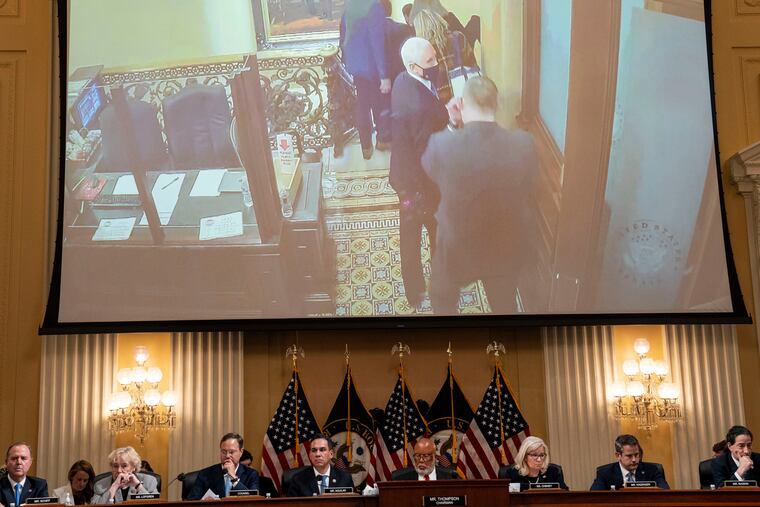Pence appears before Jan. 6 grand jury in Trump special counsel probe
Former vice president Mike Pence appeared before a grand jury that has been investigating the Jan. 6 riot at the Capitol and alleged efforts by President Donald Trump and others to overturn the results of the 2020 election, according to a person familiar with his apperance who spoke on the condition of anonymity to discuss the matter.

Former vice president Mike Pence appeared before a grand jury that has been investigating the Jan. 6 riot at the Capitol and alleged efforts by President Donald Trump and others to overturn the results of the 2020 election, according to a person familiar with his apperance who spoke on the condition of anonymity to discuss the matter.
Pence appeared at the E. Barrett Prettyman federal courthouse after a U.S. appeals court Wednesday night rejected Trump's attempt to block his former vice president from answering questions under oath about any potentially illegal acts committed by Trump. Trump has sought to overturn a lower court's ruling, disclosed March 28, requiring Pence's testimony, but a three-judge panel refused to postpone Pence's appearance while Trump's executive privilege claim goes forward.
Pence received a subpoena in early February from special counsel Jack Smith, according to a person familiar with the matter, requesting documents and testimony related to efforts by Trump to prevent his vice president from presiding over Congress's confirmation of the 2020 electoral vote before a violent mob stormed the Capitol on Jan. 6, 2021. The subpoena followed months of negotiations over prosecutors' pursuit of information about Trump's role in failed efforts to pressure Pence, the Justice Department and officials in key swing states to overturn the election, including attempts by Trump's lawyers to substitute allies for certified electors from some states Joe Biden won.
Pence's legal team had discussed potentially limited cooperation, arguing that while acting as president of the Senate during his time in office, he is entitled to congressional immunity under the Constitution's "speech or debate clause," and cannot be compelled to testify about matters related to his presiding over Congress.
However, Pence has said publicly that he is not asserting executive privilege, which could span other discussions including his conversations with Trump and other top White House advisers, and matters not directly related to his constitutionally mandated Senate role.
Attorneys for Trump challenged the Pence subpoena on executive privilege grounds to preserve the confidentiality of presidential decision-making. But after hearing from attorneys for Trump, Pence and the special counsel's office at a closed-door proceedings held March 23, Chief U.S. District Judge James E. Boasberg said the former vice president could be compelled to testify about any potentially illegal acts committed by the former president, said people familiar with the process, speaking on the condition of anonymity because of grand jury secrecy rules that generally apply to all but witnesses.
"I'm pleased that the court accepted our argument and recognized that the Constitution's provision about speech and debate does apply to the vice president," Pence said during a March 28 appearance on Newsmax.
"People can be confident that we'll - we'll obey the law. We'll tell the truth." Pence added in an interview aired Sunday on CBS's "Face the Nation."
Pence is a pivotal figure in the Trump White House's 2020 post-election maneuverings who famously refused Trump's demands that the vice president use his position to halt Congress's electoral vote count on Jan. 6 and help throw the outcome to House Republicans. Rioters that day chanted "Hang Mike Pence!" and Trump tweeted that his 2020 ticket-mate "didn't have the courage to do what should have been done."
Despite his appearance at court, Pence - a key potential rival to Trump for the 2024 Republican presidential nomination - has positioned himself as a reluctant witness who has fought demands for his testimony. He did not appear before the House select committee that investigated the Jan. 6 Capitol attack. Still, he discussed events in his book issued late last year, "So Help Me God," and in promotional interviews.
Many of his close advisers as vice president, including chief of staff Marc Short and chief counsel Greg Jacob, have relayed their experiences to the Justice Department and appeared before the grand jury. Jacob told the House committee, for example, that Trump attorney John Eastman acknowledged to him that efforts to get Pence to block Biden's electoral college victory would violate the Electoral Count Act, and that Trump was informed it would be unlawful.
While Pence has called Trump's rhetoric that day "reckless" and said his actions endangered everyone at the Capitol, including Pence's family members trapped with him there, he has publicly downplayed the idea he saw criminal conduct.
“Well, I don’t know if it is criminal to listen to bad advice from lawyers,” Pence told NBC’s “Meet the Press” last year. “The truth is, what the president was repeating is what he was hearing from that gaggle of attorneys around him. Presidents, just like all of us that have served in public life, you have to rely on your team, you have to rely on the credibility of the people around you. And so, as time goes on, I hope we can move beyond this, beyond that prospect. And this is really a time when our country ought to be healing.”